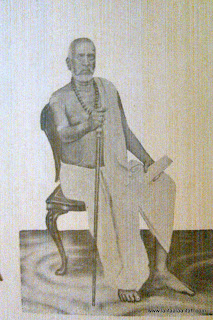mahArAj Ayilyam tirunAl ascended the throne in 1860. This ruler was good scholar in saMskR^ita (संस्कृतम्) and malayAlam (मलयालम्) and a liberal patron of literature and music. Emulating the traditional bhoja (भोज) of dhArA (धारा), he asked poets and scholars to assemble in his court everyday and favor him by conducting learned discussions. He took delight in proposing samasyA-s which the members of the assembly completed.
rAmasvAmI (रामस्वामी), the brightest in the galaxy of scholars and the favorites of the muses, excelled in this kind of literary pastime. The king cherished a high regard for the exalted intellectual and poetic abilities of rAmasvAmI (रामस्वामी) and showered on him liberal gifts and honors. The poet wrote his vR^ittaratnAvalI (वृत्तरत्नावलिः) and other works and dedicated them to his royal patron. The king consulted the poet with advantage in carrying on correspondence in saMskR^ita (संस्कृतम्) with poets and scholars and in judging the merit of literary men who came to the court for patronage. But this relationship between the king and the poet did not run smooth for long.
Once the king asked the paNDita-s (पण्डित) of the assembly to compose a stanza on the comparative merit of his reign and that of svAtI tirunAl. The paNDita-s (पण्डित) who were looking for a royal smile gave out their versification, maintaining in one voice that the rule of their patron surpassed that of his predecessor in all respects. The demand of the king was embarrassing to rAmasvAmI (रामस्वामी). He took it as an infringement of his freedom as a poet and kept silent. When the king pressed him for his contribution, he submitted that he should be excused for his inability to sell away his gifts for a cheap gain. Then the mahArAja asked the poet with cynical asperity if he had tasted the offering to his Goddess before he came to the sadas (सदस्) . The poet replied : “whether I have tested the offering or not is immaterial, but it is the royal head that the intoxication has affected”. This was indeed very bold reply to a powerful potentate, but the poet was undaunted and left the court immediately. The incident gave a tremendous shock to rAmasvAmI (रामस्वामी) and it turned the course of his life. He felt that court life and royal favors were destroying his nobility (साधुता) of heart and were implanting mental anguish (साधिता) instead.
( The poet is said to have recited the following verse on leaving the court :
चित्तभूवित्तभूमत्तभूपलाको-
पासनावासनायासनान्मे भृशम् ।
साधुता सा धुता साधिता साऽधिता
किन्तया चिन्तया चिन्तयामः शिवम् ॥
)
He fled the city and toured all over India visiting learned institution and places of pilgrimage. At kalkattA (कलकत्ता) he had literary discussions with tArAnAtha tarkavAchaspati, author of the well known saMskR^ita (संस्कृतम्) encyclopedia vAchaspatyam, who showered on him high praise. He introduced himself to the professors of the saMskR^ita (संस्कृतम्) college, banAras (वाराणसी), as a paNDita (पण्डित) from trivendram (त्रिवेन्द्रम्); bAlashAstrI (बालशास्त्री), one of the professors, asked him if he had known the author of the ma~njubhAShiNI (मञ्जुभाषिणी) commentary, and when the poet revealed that the commentator was no other than his humble self, the professor’s joy knew no bounds; he hugged him to his bosom and dubbed him abhinava mallinAtha (अभिनवमल्लिनाथः).

